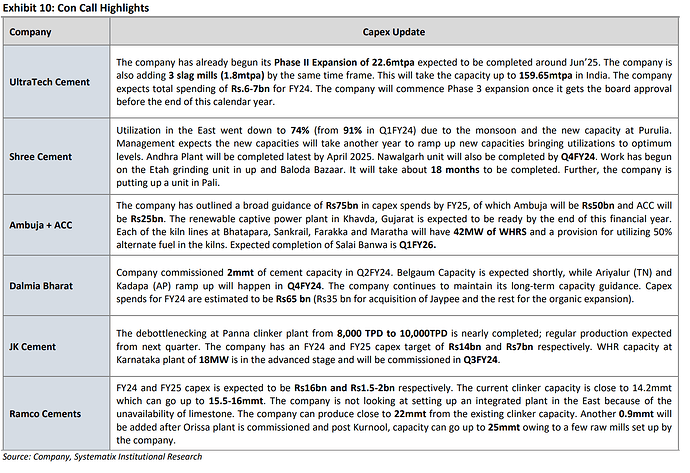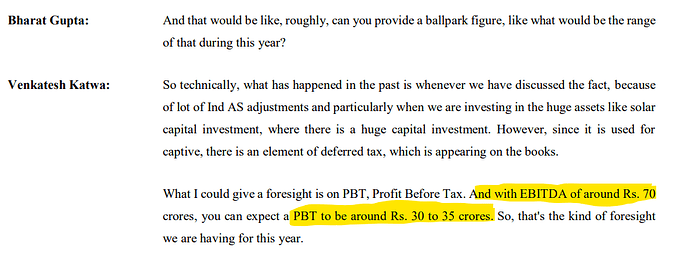Company Overview:
• Shri Keshav Cements is a family-owned and operated company with a significant promoter shareholding of 68.97%, and all shares are free of pledges.
• The company was incorporated on 1993 as “Katwa Udyog Limited” and changed name to Shri Keshav Cements and Infra Limited on 2007
• The company operates in the cement manufacturing industry, solar energy, and the sale of petroleum products.
• Their revenue contribution as of FY23 is as follows:
→ Cement: 76% of total revenues.
→ Sale of Petrol, Diesel, and Coal: 7%.
→ Solar Energy: 18%.
Cement Manufacturing:
• The cement segment contributes 76% to the company’s revenues.
• They have two cement plants in Karnataka: PLANT 1 with a capacity of 300 TPD using Vertical Shaft Kiln (VSK) technology, and PLANT 2 with a capacity of 800 TPD using Rotary Kiln technology.
• They supply cement to regions including North Karnataka, Coastal Karnataka, Goa, and parts of Maharashtra through over 600 retail touchpoints.
• Their brand is strong in Tier III markets, primarily in North Karnataka.
• They are known for producing cement at a significantly lower cost (30-40% cheaper) by running on 100% green power, making them the only cement plant in India with this approach.
Cement Brands:
They have three regional cement brands:
• Jyoti Power (43 Grade): Used in infrastructure projects.
• Jyoti Gold (53 Grade): Mainly for residential and domestic construction.
• Keshav Cement: A premium brand catering to North Karnataka and South Maharashtra.
Solar Plants:
• The solar energy segment contributes 18% to total revenues.
• They have established solar plants in Koppal, Karnataka, with a total capacity of 37 MWp to hedge power costs in cement manufacturing.
Expansion Plans:
• The company is expanding its cement production capacity nearly threefold, from 0.36 million tons to 1 million tons.
• The expansion includes implementing the latest technology in grinding and optimizing kiln operations to reduce fuel costs.
• The construction of a new pre-heater will increase clinker output by 10-20% with improved quality.
• Slag and flash utilization will increase from 30% to 50-60%, and grinding capacity will rise to 2800-2900 tons.
• The project will take up to 9 months to complete.
• The goal is to reduce fuel consumption from 1100-1150 kilo calories per ton to 750-760 kilo calories per ton, resulting in significant cost savings for reference top class Cement industries are consuming less than 700 kilo calories
• Advanced grinders will also lower power consumption by 300 to 400 units.
• As the expansion comes online they want to increase depth which increases market share in the existing market and also be able to reach the bigger markets like Pune and Bangalore whose consumption far outstrips our production and more than 10-20 times
Financial Impact of Expansion:
• The expansion project will cost approximately 110 crores but is expected to increase EBITDA by 50-60 crores.
• The company aims to save 20-22% on fuel costs and 20% on power costs.
Advantages and Challenges:
• The company’s location in Karnataka is advantageous.
• Investment in technology is expected to improve the quality of clinker and reduce cement production costs.
• Transportation and logistic costs are essential factors in their operations.
Debt:
• Debt on the balance sheet is associated with the solar projects.
Customers:
• The company is focusing on government clients and expanding its reach in villages to improve revenue realization and decrease the concentration of big-ticket customers
Market and Industry Outlook:
• Cement consumption in India is expected to grow, with a CAGR of 11-14% by 2030.
• Raw material costs have increased due to global factors, such as the Ukraine war.
Management Guidance:
• The promoter has invested equity through unsecured loans, and they may consider a mix of placement and loans for future funding.
• The company expects to achieve higher utilization rates in the coming quarters, aiming for 80% utilization.
• Future plans include diversifying into RNC, Cement Boards, and Panels, with a focus on utilizing cement in these products to optimize fuel consumption.
• Plans to increase the number of retail touchpoints and marketing budget after the expansion project.
In summary, Shri Keshav Cements is a regional cement manufacturer with a strong focus on cost efficiency, green power utilization, and expansion plans to capture the growing demand for cement in India. Their unique approach to cost savings and investment in technology positions them for future growth in the cement industry.
Strictly, No Recommendation
Open for discussion!!
Disclosure: Tracking position, for educational purposes & can be biased



